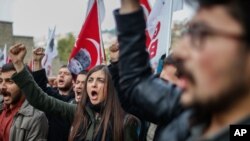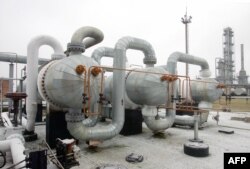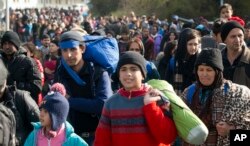Leaders of the world's 20 biggest economies (the G20) are to meet in the Turkish resort town of Antalya for two days, starting Sunday, to discuss economic and tax cooperation, the migrant crisis and climate change.
We take a look at what to expect and what it means.
What is the G20?
The G20, an abbreviation for “The Group of Twenty,” is an international forum for the governments and central bank governors of 20 major economies.
The members include 19 individual countries -- Argentina, Australia, Brazil, Canada, China, France, Germany, India, Indonesia, Italy, Japan, South Korea, Mexico, Russia, Saudi Arabia, South Africa, Turkey, the United Kingdom and the United States -- along with the European Union. The EU is represented by the European Commission and by the European Central Bank.
The G20 countries account for 85 percent of the world economy, 75 percent of world trade and two-thirds of the world's population.
Who will attend the summit?
U.S. President Barack Obama, Russian President Vladimir Putin, British Prime Minister David Cameron, German Chancellor Angela Merkel, French President François Hollande and Chinese President Xi Jinping, along with many other leaders around the world, are expected to attend the summit.
The leaders of Spain, Azerbaijan, Malaysia, Senegal, Singapore and Zimbabwe also will attend the summit at the invitation of Turkey, even though they are not members of the G20.
Why Turkey?
Turkey officially took over the presidency of the G20 from Australia on December 1, 2014. China will preside over the organization in 2016.
The issues on the table
Global economies, the worst migrant crisis since World War II and climate change are expected to dominate the talks at the summit.
Global economies
Several emerging economies are facing major struggles.
Andrew Kenningham, a consultant at Capital Economics in London, said Russia is suffering the most of the emerging economies.
Russia’s economy “is contracting by maybe 5 percent this year,” he said. It is struggling with the collapse in oil prices and sanctions set by Western nations after Russia annexed Ukraine's Crimea. Poor governance is another factor.
This “has made it extremely difficult for businesses to operate there,” Kenningham said.
The G20 summit also will focus on China, too. Official economic growth in China has slowed to less than 7 percent. This caused a sell-off in the stock market and pushed down oil prices. But Kenningham said the fears are exaggerated.
China said this week it wants the G20 to reform the voting rights at the International Monetary Fund. China says it wants a larger role. The IMF is an organization of 188 countries, working to increase global economic growth and promote international trade.
Migrant crisis
Ahead of the G20 summit, European Union leaders gathered Thursday for an informal meeting in the Maltese capital, Valletta, to discuss the migration crisis that has seen more than a half-million refugees enter the EU since the start of the year, threatening to dismantle Europe's open internal borders agreement.
The discussion is expected to continue in Turkey as European leaders ask the world to help tackle the problem.
The migrants, mainly from war-torn Syria, Iraq and poor sub-Saharan Africa, enter the European Union predominantly through Greece and Italy after crossing the Mediterranean in boats from Turkey and North Africa. Many have drowned on the way.
Earlier this month, the chairman of EU leaders Donald Tusk and the head of the European Commission, Jean-Claude Juncker, said, "The G20 must rise to the challenge and lead a coordinated and innovative response to the crisis that recognizes its global nature and economic consequences and promotes greater international solidarity in protecting refugees.”
Climate change
The G20 countries spend almost four times as much to prop up fossil fuel production as they do to subsidize renewable energy, calling into question their commitment to halting climate change, the Overseas Development Institute said on Thursday.
It said the G20 spent an average of $78 billion on national subsidies delivered through direct spending and tax breaks in 2013 and 2014.
Another $286 billion was invested in fossil fuel production by G20 state-owned enterprises.
Meanwhile, renewable energy subsidies in 2013 were estimated at $121 billion by the International Energy Agency (IAEA).
"It is tantamount to G20 governments allowing fossil fuel producers to undermine national climate commitments, while paying them for the privilege," ODI said.
Olivia Gippner of the London School of Economics said climate change also will be high on the G20 agenda, "particularly because we have the Paris [climate] summit coming up in December, and this is one of the last meetings where the big economies and the big actors also on climate change will come together.”






